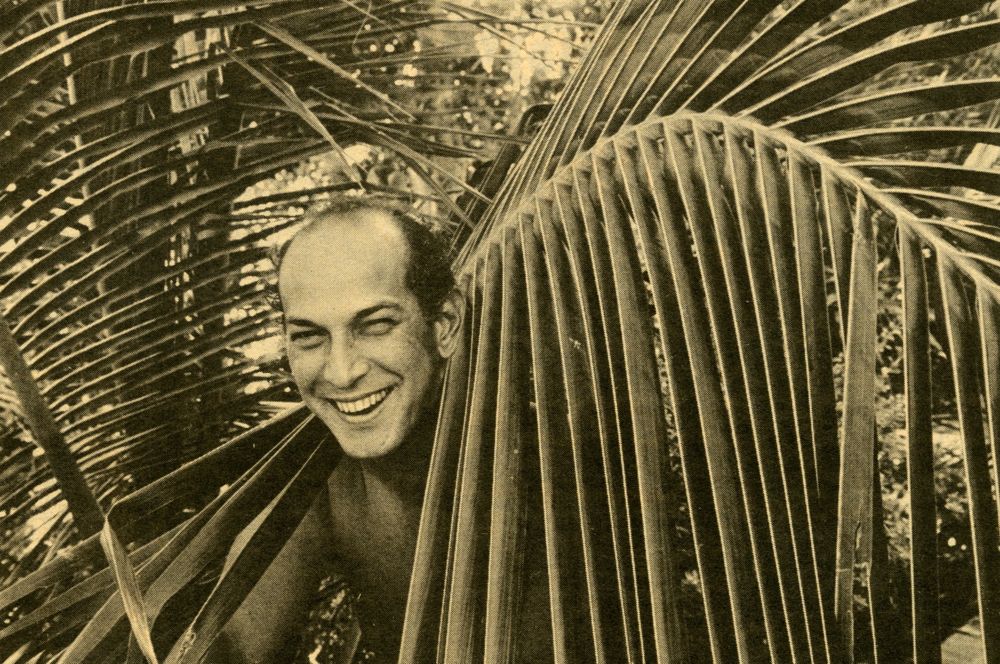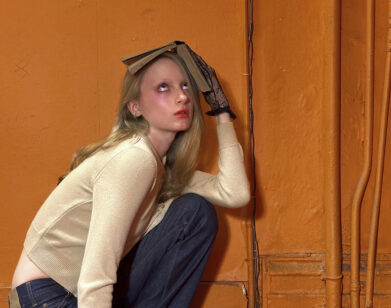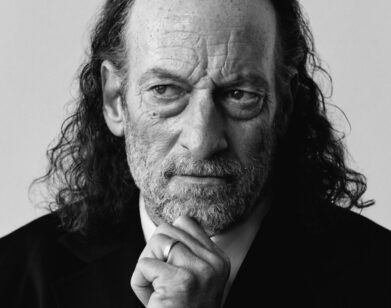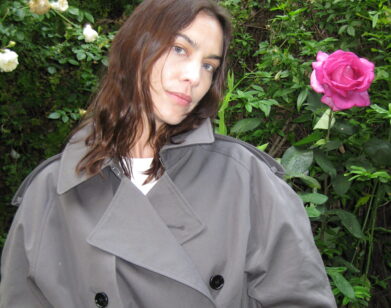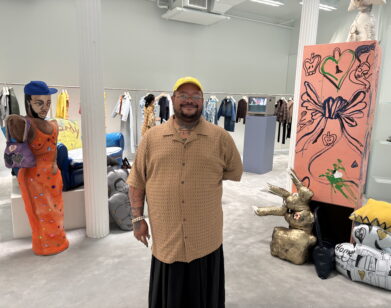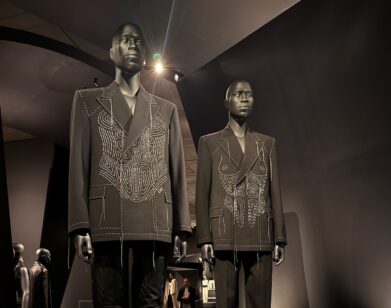Remembering Oscar de la Renta
On Monday, fashion designer Oscar de la Renta passed away at the age of 82. Born in the Dominican Republic, de la Renta began his design career at Balenciaga in the late 1950s, and worked at Lanvin and Elizabeth Arden before starting his eponymous label in the late 1960s (he also did a stint at Balmain from 1992 to 2002). Synonymous with uptown glamour, he’s dressed first ladies (everyone of them since Hillary Clinton) and film stars, and was prominently name-dropped in Sex and the City. Peter Copping, formerly of Nina Ricci, will take over as creative director of his label.
In memory of the designer, we’ve reprinted this interview from our June 1977 issue.
Oscar de la Renta
By Jeanette Longoria
Interview sent one of Mexico’s most glamorous women, Jeanette Longoria, to interview her favorite fashion designer, Oscar de la Rent, who is pretty glamorous himself.
JEANETTE LONGORIA: I read this morning that you are the President of the Council of Fashion Designers of America, and I didn’t realize until today that your group is responsible for bringing the shows to the museums, like the Russian collection.
OSCAR DE LA RENTA: Well actually, we co-sponsor with the Metropolitan Museum the opening night that we have each year for the shows. The money that we raise that night pays the expense of the Costume Institute, to keep it going and bring these shows.
LONGORIA: Are you ever inspired by any of the costumes shown?
DE LA RENTA: Of course. I have gone for many years to the Costume Institute, just because they have such a marvelous research library in costumes. Back in 1967, when I first did my work with the Russians and the gypsies, the peasant look—a lot of the ideas came form things that I had seen at the Institute.
LONGORIA: Were you inspired by all of the colorful things where you grew up, in Santo Domingo?
DE LA RENTA: I suppose that that’s part of my background. I come from a very warm island, where colors are very important, very vibrant, and obviously the color has been an influence on my work.
LONGORIA: Tell me, I know you’ve been off Garment Avenue for a long time, but I’ve read that you were called the Grandfather of Fashion before you were 40. What exactly does that mean?
DE LA RENTA: I don’t know. I would like better to be known as the Godfather of Fashion, with all the implications that that word has.
LONGORIA: It seems a little premature to call you a grandfather.
DE LA RENTA: Well, the boys in the islands are very precocious, you know, so…
LONGORIA: You’ve won the Coty Award three times?
DE LA RENTA: Yes, in ’67, ’68 and ’73.
LONGORIA: And then you were voted to the Hall of Fame.
DE LA RENTA: That’s right.
ELEANOR LAMBERT: Well no, the third time was the Hall of Fame.
LONGORIA: Weren’t you terribly excited?
DE LA RENTA: I was excited by the first two. The third one, I had really waited too long.
LONGORIA: You’re so modest. You never tell anyone about these awards. I think I’d be wearing mine.
DE LA RENTA: Well, there are so many. Not really that many, a few.
LONGORIA: I’m terribly excited about seeing the new line of shoes. This is the first…
DE LA RENTA: Actually, yes, this is my first line. They’re made in Spain.
LONGORIA: I think women will be crazy over them. I’d like to walk out with all of them right now. Oscar is an old, old friend from Mexico. Everyone there absolutely adores him, and he’s won two of the Gold Medal awards in Mexico.
DE LA RENTA: Without trying.
ELEANOR LAMBERT: You have a house in Mexico as well?
DE LA RENTA: No, I don’t. Well, I do, because Jeanette has a house there and I consider it my house as well. And what a house!
LONGORIA: The last time Oscar was in Mexico I had a party for him. I invited you Eleanor, but you couldn’t come.
DE LA RENTA: It was really beautiful, a sort of Moroccan party. It was extraordinary the way the room was made up, the food, every single detail. I have never seen such perfection, such a huge effort, just for one evening and very few people. That’s real luxury. I mean, a lot of people will do work like that to invite a big crowd, but in this case it was a very small party, only a hundred or so.
LONGORIA: It was so much fun when the belly dancer came in! Did you see the men falling over their chairs, taking their glasses out, and all the wives holding their husbands down? And it was so difficult to find one in Mexico. The food wasn’t that much trouble, but it took almost a month to get a belly dancer. Since then I’ve learned how to do it.
DE LA RENTA: Not belly dancing!
LONGORIA: Oscar, really. I must say, everyone wants to dance with Oscar. We fight over him. Well, Oscar’s new dress that I have on is absolutely sensational. What trends do you see happening this year?
DE LA RENTA: I think that that dress is a good indication of what I’m doing for fall. There will be a lot of glitter, a lot of gold. I have done metallic dresses in the past, but they were always very heavy, heavy brocades. This one is very airy, very soft and very liquid—sort of liquid gold, for a golden lady.
LONGORIA: Tell me, how many years ago did you meet Eleanor Lambert?
LAMBERT: That goes into the story. I don’t know how many years.
DE LA RENTA: I know exactly when. It was 1963, when I first came over. Listen, whatever happened to that man—the time I was in Mexico and Jeanette had that marvelous party. I had the worst pain in my back, and I really couldn’t move. You remember? I was really feeling terrible, and Jeanette said don’t worry, because I have the man who can fix you up right away. So she took me into her bedroom, asked me to take my shoes off, and made me lie down on her bed. I was very flattered—flattered and flat. I got into bed, all the lights were dark—it was really extraordinary, he never touched me, but I could feel the warmth of his hands. Then I got out of bed and the pain was gone. It was really fantastic. I mean, I really went into the bedroom more out of curiosity than expecting to feel much better.
LONGORIA: He’s very curious. He said he was from outer space and he believes that these effects come from a radiation. You can definitely—I could feel a heat.
LAMBERT: How extraordinary.
LONGORIA: Another curious things that I’ve seen him do is—people will be in a room talking, and if he doesn’t want a certain person to listen, he does something and the person falls asleep.
DE LA RENTA: I’ve been to a lot of dinners where I could have used those powers.
LONGORIA: Well, let me know and I’ll see if he’ll fly over in one of his spaceships.
LAMBERT: Do you see him regularly?
LONGORIA: Well, I did for a while but he just appears and disappears. I don’t know what happens to him.
DE LA RENTA: He goes up to Mars.
LONGORIA: One day it was very curious. He said that he was going to hypnotize me, so we had a hypnosis. I kept insisting to Chito, my husband, that he had some papers in a certain file in another city. Chito, I could hear him, kept saying “No, no, no I don’t,” but he went and found these papers that he didn’t even know he had. Chito said he hated telling his lawyer, “My wife found these—in a trance.” Well. What else can you tell me about the Council of Fashion Designers?
DE LA RENTA: Well, perhaps. [in jest] I should tell you that the Council of Fashion Designers of America is a national neurotic society of creative leaders in various fields of fashion.
LONGORIA: What would you say is the most fun about being a designer? Meeting wonderful women like me?
DE LA RENTA: I think the most fun, the most excitement, is when you are three days from showing a collection.
LONGORIA: I think people would be interested in hearing about your home in Santo Domingo. I’ve seen photographs in magazines, although I’ve never been there.
DE LA RENTA: That place is actually called La Romana. Everyone says Santo Domingo, but that is actually the name of the city —the country is the Dominican Republic, and the place where I am is La Romana. It’s a resort that is very beautiful, very unspoiled, very few people, and the house is very nice.
LONGORIA: I’ve heard that you’ve done a lot for an orphanage…
DE LA RENTA: That’s probably why I’m called The Grandfather. I have an orphanage in the Dominican Republic with 354 children. We started from scratch, really, and now it’s marvelously well organized. When asked to describe what it is, I always say “It’s a very poor version of Boy’s Town of Omaha” … what was his name, Father Flanagan, who founded that? It’s self-supporting now, almost. I raised the money to build the dormitories abd the schools, but it’s in the countryside and they raise their own chickens, and eggs, and vegetables.
LONGORIA: That’s wonderful. I’d love to see it
DE LA RENTA: You will have to come, so you can see the un-frivolous side of me.
LONGORIA: I never think of you as frivolous. Are you planning to do any fragrances?
DE LA RENTA: Yes, I have a fragrance that is coming out in September. It’s really extraordinary; the bottle is the most beautiful bottle you have ever seen. It’s very romantic; it’s very expensive; and it’s made, created, and packaged in France. I’m going to give you some.
THIS INTERVIEW ORIGINALLY RAN IN THE JUNE 1977 ISSUE OF INTERVIEW.
For more interviews from our archive, click here.

